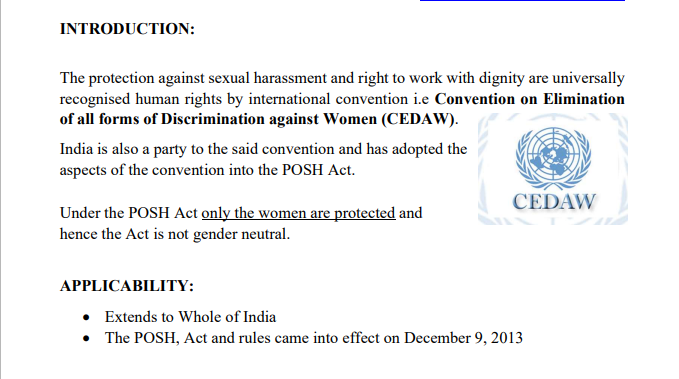The Sexual Harassment of Women at Workplace (Prevention, Prohibition & Redressal) Act, 2013
- The Sexual Harassment of Women at Workplace (Prevention, Prohibition & Redressal) Act, 2013 (“POSH Act”)
- INTENT – IMPACT – ASSESSMENT WITH FAQ’S
- INTRODUCTION:
- APPLICABILITY:
- SCOPE:
- DEVELOPMENT OF POSH ACT:
- IMPORTANT DEFINITIONS:
- Q: Women who are not employed with the workplace can avail of this Act?
- Q: What are the various forms of sexual harassment at the workplace?
- Q: Does the act constituting sexual harassment have to occur at the workplace?
- CONSTITUTION OF INTERNAL COMPLAINT COMMITTEE (“ICC”)
- Q: How to locate ICC in your organization?
- Q: What if ICC is not constituted in an organization?
- CONSTITUTION OF LOCAL COMPLAINT COMMITTEE (“LCC”)
- Q: How to locate LCC in a particular district?
- Q: How many employees are required in an organization to form ICC?
- COMPLAINT OF SEXUAL HARASSMENT:
- Q: What a Complaint Committee does when a complaint is submitted to it?
- Q: What is the time frame under the POSH Act?
- Q: How the confidentiality of the complaint(s) is maintained under the Act?
- Q: Can a woman register both FIR and lodge complaints with ICC/LCC at the same time?
- Q: Can the woman ask for some interim relief during the inquiry of ICC?
- DISCLAIMER:
- Download the copy:
The Sexual Harassment of Women at Workplace (Prevention, Prohibition & Redressal) Act, 2013 (“POSH Act”)
INTENT – IMPACT – ASSESSMENT WITH FAQ’S
INTRODUCTION:
The protection against sexual harassment and the right to work with dignity are universally recognized human rights by international convention i.e Convention on Elimination of all Forms of Discrimination against Women (CEDAW).
India is also a party to the said convention and has adopted the aspects of the convention into the POSH Act.
Under the POSH Act, only the women are protected and hence the Act is not gender-neutral.
Related Topic:
Compliances and Returns Under Prevention of Sexual Harassment (POSH) Act
APPLICABILITY:
- Extends to Whole of India
- The POSH, Act, and rules came into effect on December 9, 2013
SCOPE:
POSH Act was enacted by Parliament to give effect to the Convention for the protection of women against sexual harassment at the workplace.
The POSH Act covers sexual harassment resulting in any violation of the women’s fundamental rights to equality under articles 14 and 15 of the Constitution of India and her right to life and lives with dignity under Article 21 of the constitution and right to practice any profession or to carry on any occupation, trade or business which includes a right to a safe environment free from sexual harassment.
The POSH Act sets out the constitution of the committees, the process to be followed for making a complaint, and inquiring into the complaint in a time-bound manner.
“IT IS NOT THE INTENT BUT THE IMPACT WHAT MATTERS”
DEVELOPMENT OF POSH ACT:
Before the introduction of the POSH Act, there was no specific remedy to address the causes of sexual harassment at the workplace in India. Women that were sexually harassed had to file a complaint with police and such complaints were generally filed under Section 354 and 509 of the Indian Penal Code.
The POSH Act was later triggered by the Vishakha case (Vishakha v. State of Rajasthan) in 1997 where Hon’ble Supreme Court provided the basic definition of sexual harassment at the workplace and provided guidelines (“Vishakha Guidelines”) to deal with it. The decision of the case was seen as a legal victory for the women in India.
Vishakha Guidelines were not sufficient for the legal compliance by the employers and were replaced by a full-fledged statute of the Parliament known as The Sexual Harassment of Women at Workplace (Prevention, Prohibition & Redressal) Act, 2013.
IMPORTANT DEFINITIONS:
1. Sexual Harassment {Section 2(n)}: includes any one of the following unwelcome act or behaviour (whether a director or by implication) namely:
- Physical contact and advances; or
- A demand to request for sexual favours; or
- Making sexual colored remarks, or
- Showing pornography; or
- Any other unwelcome physical, verbal or non-verbal conduct of sexual nature
2. Aggrieved Woman {Section 2(a)}: means
- In relation to a workplace, a woman, of any age whether employed or not, who alleges to have been subjected to any act of sexual harassment by the respondent;
- In relation to a dwelling place or house, a woman of any age who is employed in such a dwelling place or a house
3. Employer {Section 2(g)}: means in relation to any department, organization, undertaking, establishment, enterprise, institution, office, branch or unit of the appropriate Government or a local authority, the head of that department, organization, undertaking, establishment, enterprise, institution, office, branch or unit or such other officer as the appropriate Government or the local authority, as the case may be, may by an order specify in this behalf
4. Workplace {Section 2(o)}: includes
- any department, organization, undertaking, establishment, enterprise, institution, office, branch or unit which is established, owned, controlled or wholly or substantially financed by funds provided directly or indirectly by the appropriate Government or the local authority or a Government company or a corporation or a co-operative society;
- any private sector organization or a private venture, undertaking, enterprise, institution, establishment, society, trust, non-governmental organization, unit or service provider carrying on commercial, professional, vocational, educational, entertainment, industrial, health services or financial activities including production, supply, sale, distribution or service;
- hospitals or nursing homes;
- any sports institute, stadium, sports complex or competition or games venue, whether residential or not used for training, sports or other activities relating thereto;
- any place visited by the employee arising out of or during the course of employment including transportation by the employer for undertaking such a journey;
- a dwelling place or a house;
5. Employee {Section 2(f)}: means
A person employed at a workplace for any work on regular, temporary, ad hoc or daily wage basis, either directly or through an agent, including a contractor, with or, without the knowledge of the principal employer, whether for remuneration or not, or working on a voluntary basis or otherwise, whether the terms of employment are express or implied and includes a co-worker, a contract worker, probationer, trainee, apprentice or called by any other such name.
6. Domestic Worker {Section 2 (e)}: means
a woman who is employed to do the household work in any household for remuneration whether in cash or kind, either directly or through any agency on a temporary, permanent, part-time, or full-time basis, but does not include any member of the family of the employer.
The definition of employee under the POSH Act is broad, and encompasses persons employed on a temporary, ad hoc, or daily wage basis, and includes apprentices, trainees, volunteers, and persons employed at a workplace through an agent or contractor.
Q: Women who are not employed with the workplace can avail of this Act?
Any woman, whether she is in the capacity of a permanent, temporary, ad-hoc, or daily wage basis employee, shall be protected under this Act. This also includes women who are engaged directly with the principal employer, or indirectly through an agent including a contractor, with or without the knowledge of her principal employer. A woman does not necessarily have to be a salaried employee, she might be working on contact or as a volunteer, her employment contract might be expressed or implied, and even then she is protected under this Act.
A student, working as an intern with a law firm, if sexually harassed by an employee of the firm, is an aggrieved woman. Despite the fact that she does not have an expressed employment contract, the student may seek for aid under the Act.
Woman labour collects coals in a coal mine. She is not directly engaged with her principal employer nor is she a salaried employee. If sexually harassed by her colleague, she shall be an aggrieved woman within the definition of the Act despite of working in the coal mines on the basis of a daily wage and having no proper employment contract.
Q: What are the various forms of sexual harassment at the workplace?
It can involve conduct such as:
- unwelcome touching, hugging or kissing
- staring or leering
- suggestive comments or jokes
- unwanted or persistent requests to go out
- intrusive questions about another person’s private life or body
- Deliberately brushing up against someone
- insults or taunts of a sexual nature
- sexually explicit pictures, posters, screen savers, emails, twitters, SMS or instant messages
- accessing sexually explicit internet sites
- inappropriate advances on social networking sites
- behaviour which would also be an offense under the criminal law, such as physical assault indecent exposure sexual assault, stalking or obscene communications.
Q: Does the act constituting sexual harassment have to occur at the workplace?
No. The act does not necessarily have to occur at the workplace only. It could occur in any of the following places:
- Social event organized by your employer,
- During work-related travel,
- At a client or customer’s premises,
- At training events, business lunches or dinners, promotional campaigns or public relations events with clients, customers or prospective partners or
- During the course of work-related phone conversations or communications via electronic media.
CONSTITUTION OF INTERNAL COMPLAINT COMMITTEE (“ICC”)
Section 4 of the POSH Act provides for the employer to constitute an Internal Complaint Committee having the following members:
- Presiding Officer / Chairperson – Women working at the senior level in the organization
- 2 Members (at least) – Amongst employees committed to women issues have legal knowledge or experience in social work
- 1 Member – from NGO
Provided that at least one-half of the total nominated members shall be the woman
If the organization has workplaces located at different places or division or sub-division level, then ICC will be constituted at every workplace.
The Presiding Officer and every other member shall hold office for a period not exceeding three years, from the date of their nomination.
Q: How to locate ICC in your organization?
As per the Act, the employer is obligated to display the order constituting ICC at any conspicuous place in the workplace
Q: What if ICC is not constituted in an organization?
If an employer fails to constitute the ICC, he shall be punishable with fine which may extend to fifty thousand rupees.
CONSTITUTION OF LOCAL COMPLAINT COMMITTEE (“LCC”)
Section 5 of the POSH Act provides that the Appropriate Government will notify the District Magistrate/Additional District Magistrate/ Collector/ Deputy Collector as District Officer in every district, who will constitute a Local Complaints Committee (LCC) so as to enable women in the unorganized sector or small establishments to work in an environment free of sexual harassment. The LCC will have the following members:
- Chairperson- Nominated from amongst the eminent women in the field of social work and committed to the cause of women
- Member- Nominated from amongst the women working in the block, taluka or tehsil or ward or municipality in the district
- 2 Members- Nominated from amongst such NGO/ associations/persons committed to the cause of women or familiar with the issues relating to sexual harassment, at least one must be a woman
Provided that At least one must have a background of law or legal knowledge
- Ex Officio member – The concerned officer dealing with social welfare or women and child development in the district
Q: How to locate LCC in a particular district?
For locating LCC or one of its members, one can adopt the following measures:
- Contact the District Officer’s office
- Contact Women Helpline functioning in your district/State
- Contact the State Commission for Women
- Contact the State Department of Women and Child Development/department looking after women issues
Q: How many employees are required in an organization to form ICC?
An organization having 10 or more employees (permanent, temporary, ad-hoc or daily wages basis, interns, etc) is required to constitute ICC
COMPLAINT OF SEXUAL HARASSMENT:
Any aggrieved woman may make a complaint, in writing, about the sexual harassment at workplace to the ICC or LCC as the case may be within a period of three months from the date of the incident and in case there are series of incidents, then within three months from the date of the last incident.
The ICC or LCC may extend the period for a period not exceeding three months for the reason to be recorded in writing and on being satisfied that the circumstances were such that prevented the woman to make complaint within stipulated time.
In case, the aggrieved woman is unable to submit a written complaint, the Complaints Committee will provide her all assistance so that the complaint could be submitted in written form.
The Complaints Committee (ICC/LCC) will conduct an inquiry into the complaint by calling all the concerned parties i.e. complainant, respondent [the person(s) against whom the complaint is being made], witnesses, etc. Later, on the basis of the testimonies of the concerned parties and evidence (documentary or otherwise) gathered, the Committee will frame its findings, which will be shared with the employer.
If the Committee comes to the conclusion that the allegations against the respondent are genuine, it shall recommend action that needs to be taken by the employer against such person. However, if the Committee concludes after an inquiry that no case is being made against the respondent, it shall recommend that no action be taken against the respondent.
Q: What a Complaint Committee does when a complaint is submitted to it?
The Complaints Committee (ICC/LCC) will conduct an inquiry into the complaint by calling all the concerned parties i.e. complainant, respondent [the person(s) against whom a complaint is being made], witnesses etc. Later, on the basis of the testimonies of the concerned parties and evidence (documentary or otherwise) gathered, the Committee will frame its findings, which will be shared with the employer.
If the Committee comes to the conclusion that the allegations against the respondent are genuine, it shall recommend action that needs to be taken by the employer against such person. However, if the Committee concludes after an inquiry that no case is being made against the respondent, it shall recommend that no action be taken against the respondent.
Q: What is the time frame under the POSH Act?
| Description | Timeframe |
| Submission of Complaint | Within 3 months of the last incident |
| Completion of Inquiry | Within 90 days |
| Submission of Report by ICC/LCC to the employer/DO | Within 10 days of completion of the inquiry |
| Implementation of Recommendations by employer | Within 60 days |
| Appeal | Within 90 days of the recommendations |
Q: How the confidentiality of the complaint(s) is maintained under the Act?
The Act prohibits the disclosure of:
- Identity and address of complainant, respondent and witnesses
- Information pertaining to conciliatory/ inquiry proceedings or recommendation of ICC or action taken by the employer.
Breach of confidentially will invite a penalty of Rs. 5,000/- which will be collected by the employer
Exception: Dissemination of information regarding the justice secured without disclosure of name, address, identity and particulars of complainant or witnesses
Q: Can a woman register both FIR and lodge complaints with ICC/LCC at the same time?
Yes, a woman if she chooses to do so may both file the FIR with the police and complaint with Complaints Committee simultaneously.
Q: Can the woman ask for some interim relief during the inquiry of ICC?
During the inquiry, at the written request of the complainant, ICC can provide following interim reliefs to the complainant:
- Transfer the complainant or respondent to any other place
- Grant leave to the complainant for up to 3 months in addition to her entitled leave
- Restrain the respondent from reporting on the work performance/ writing confidential report of aggrieved
- Restrain the respondent from supervising academic activities of aggrieved
Sexual harassment is gender discrimination that involves sexual advances, a request for sexual favours, and any other verbal or physical conduct of a sexual nature.
It is not the intent but is the perception and impact which determines whether or not an act is a sexual harassment.
If this behaviour is not addressed in a corrective manner, it may cause a tense work situation and increased acts of the behaviour.
DISCLAIMER:
The content of this document has been prepared on the basis of relevant provisions and information available. Utmost care has been taken to ensure the accuracy, completeness, and reliability of the information provided since data provided herein has been obtained from the Act and from the website of the Ministry of Women and Child Development. The author assumes no responsibility thereof.
In NO EVENT, the author shall be liable for any direct or indirect, special, or incidental damage resulting from or arising out of or in connection with the use of the information provided in the article.
Download the copy:
If you already have a premium membership, Sign In.














